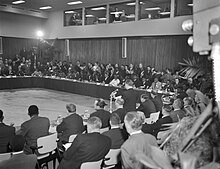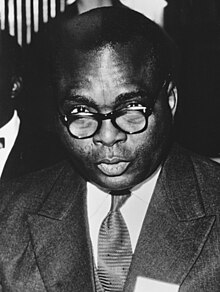|
Belgo-Congolese Round Table Conference The Belgo-Congolese Round Table Conference (French: Table ronde belgo-congolaise) was a meeting organized in two parts[1] in 1960 in Brussels (January 20 – February 20[2] and April 26 – May 16[3]) between on the one side representatives of the Congolese political class and chiefs (French: chefs coutumiers) and on the other side Belgian political and business leaders.[2] The round table meetings led to the adoption of sixteen resolutions on the future of the Belgian Congo and its institutional reforms. With a broad consensus, the date for independence was set on June 30, 1960. BackgroundThe idea for a round table conference was first formulated in 1959 by the Congolese Labour Party (PTC, French: Parti Travailliste Congolais).[4] It gathered support from the Bakongo Alliance (ABAKO) and the Belgian Socialist Party (PSB).[4] The idea of a bilateral conference aimed at organising the independence of the Belgian colony was in turn adopted by the Minister of the Belgian Congo and Ruanda-Urundi, August de Schryver, who was also the leader of the Christian Social Party, Belgium's largest political party at the time.[5] Several factors contributed to this idea taking shape, including:
The creation of a large scale Belgian-Congolese dialogue was also compatible with a speech from Belgian King Baudouin broadcast on January 13, 1959. Where he expressed the desire to "lead the Congolese populations, without harmful procrastination, but also without thoughtless haste, toward independence, in prosperity, and in peace."[10] On January 3, 1960, the Belgian government announced it was convening a round table conference with the goal of helping the Congolese transition from colonial rule to independence.[3] The Congolese delegationsA number of traditional chiefs (chefs coutumiers) were invited to the Round Table Conference to reduce the proportion of key independence figures in the delegations.[11] The following is a complete list of the Congolese delegates and their Belgian advisers to the first conference:[12][a] Political parties


Tribal chieftains
Advisers
OtherEdouard Bayona, a Congolese attaché to the Belgian government, was appointed to attend the conference.[13] Journalist and future Congolese dictator Joseph-Désiré Mobutu attended the conference as Patrice Lumumba's secretary.[11] Belgian delegationOn the Belgian side, among others, the following people were present:[11]
Étienne Davignon, future vice-president of the European Commission, was also at the conference attached to the Belgian Ministry of Foreign Affairs Lumumba’s eligibility and arrivalImportant information regarding the Congolese delegation is the fact that Patrice Emery Lumumba was part of the original delegation. He was in prison. It’s Joseph Kasa-Vubu who put pressure on the Belgian government and demanded the release of Lumumba from prison so that he can join the original delegation in Belgium. Kasa-Vubu was the only person who fought for the release of Lumumba. Hence, the say “Kasa-Vubu made Lumumba as one of the fathers of the Belgian Congo independence… through his released from prison and his subsequent participation in the Round Table” (Nzita Na Nzita). In short “Et Kasa-Vubu ressuscita l’homme politique Lumumba” (Nzita Na Nzita). This is one of the reason Lumumba backed Kasa-Vubu candidacy for the presidency even though Abako was third in the May election (1960). The adage is simple “you scratch my back I’ll scratch yours in turn” which nowadays can be interpreted as a “win-win situation” for both of them Kasa-Vubu and Lumumba. In this respect, the Round Table organized a vote[14] that consisted of fourteen questions. Question 9 dealt with Lumumba’s case since His criminal record was already tainted as he was already convicted by the colonial justice for embezzlement of public funds of the PTT (Telegraph and Telephone Post) of the city of Stanleyville. Question 9 was formulated as follows:” Is it necessary to provide for a softening to the exclusion provisions at eligibility (amendment written by ABAKO-PSA-MNC-PP so as to enable Lumumba's eligibility?” The result was as follows: Out of the 11 political groups, six political groups voted "yes". They included Cartel (Abako; M. N.C.-Kalonji; P.S.A.; Parti du Peuple; F.G.C.et Abazi), Cerea, M. N.C.-Lumumba, Assoreco, Cartel Katangais (Balubakat-Fedeko-Atcar) et Union Congolaise. Four political groups voted against the motion "no". They were P.N.P., Conakat, Alliance Rurale Progressiste (Kivu), and Délégation des chefs coutumiers. One political group, Union Congolaise, abstained. Ruanda-Urundi delegationRepresentatives from Ruanda and Urundi attended in preparation for the independence of their respective territories.[15] Ruanda
Urundi
PreludeOn the eve of the conference the Congolese delegations held a series of meetings. Concern was expressed by Congolese students in Brussels that disunity in the Congo would prevent the delegates from taking advantage of Belgium's tenuous position. As a result, almost all of the delegations resolved to form a "Common Front" (Front Commun) to present their demands at the conference.[16] That evening the Common Front released its first statement. It was demanded that the negotiations be more than consultative; all decisions reached should be made binding on the Belgian government. It also required that the Congo should immediately be granted independence. De Schryver and the Belgian delegation were shocked by the joint statement, having underestimated the full extent of Congolese discontent and their willingness to cooperate across party lines.[17] First conferenceThe Round Table Conference was opened on January 20 with a speech by Belgian Prime Minister Gaston Eyskens.[18] ResultsAt the end of the conference, the following notable resolutions were adopted:[1]
See also
Notes
Citations
References
|
